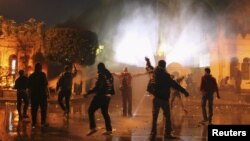CAIRO —
Anti-government demonstrators clashed with security forces facing Egypt's presidential palace Friday evening, throwing gasoline bombs as police responded with tear gas and water cannons.
Huge balls of fire were seen on the sides of palace as smoke billowed over the streets. President Mohamed Morsi said in a statement that security forces would "act with utmost decisiveness" to protect the palace and other state buildings.
Opposition protests had grown larger by late afternoon in Cairo as groups of demonstrators gathered in Tahrir Square and near the palace. Cold weather and intermittent rain may have discouraged many people from turning out earlier, but by nightfall, crowds swelled.
Arab media reported that Egyptian Army troops were stationed at the entrances of Cairo to maintain security. A heavy security detail was near the presidential palace.
Port Said protests
At the mouth of the Suez Canal in Port Said, thousands of protesters chanted slogans against the government, following Friday prayers. The protest coincided with the first anniversary of a bloody soccer stampede at Port Said's main stadium.
Tensions have been running high in the city since a court decision last Saturday convicting 21 people to death after finding them responsible for the tragedy. Many Port Said residents complain that the convictions were arbitrary and that the judiciary convicted the men to appease rival soccer fans from Cairo.
News reports on Friday said that a large crowd gathered outside the government's provincial headquarters but did not attempt to storm the building. Police and army troops were stationed at different points surrounding the government complex.
Many top political leaders signed an agreement Thursday renouncing the violence, following a national dialogue meeting with Egyptian Islamic scholar Sheik Ahmed al-Tayeb.
Dialogue doubtful
Leftist political leader Hamdeen Sebahi said he had agreed to renounce violence but "not to give up on the revolution."
Said Sadek, who teaches political sociology at the American University in Cairo, said that the government did not respect a previous agreement over the constitution, making the likelihood of a compromise doubtful.
"National dialogue in Egypt is a dialogue of the deaf because we will not reach a compromise," he said.
Sadek said that the "real trouble in Egypt is formulating a fair and equitable political system." Political tensions, he predicts, will continue "because the objectives of the revolution have not been realized."
The unrest began on January 24 in Cairo on the eve of the second anniversary of the 2011 revolution and has spread to several cities.
Protesters accuse the Muslim Brotherhood, which dominates Morsi's government, of attempting to monopolize power two years after the revolution.
Huge balls of fire were seen on the sides of palace as smoke billowed over the streets. President Mohamed Morsi said in a statement that security forces would "act with utmost decisiveness" to protect the palace and other state buildings.
Opposition protests had grown larger by late afternoon in Cairo as groups of demonstrators gathered in Tahrir Square and near the palace. Cold weather and intermittent rain may have discouraged many people from turning out earlier, but by nightfall, crowds swelled.
Arab media reported that Egyptian Army troops were stationed at the entrances of Cairo to maintain security. A heavy security detail was near the presidential palace.
Port Said protests
At the mouth of the Suez Canal in Port Said, thousands of protesters chanted slogans against the government, following Friday prayers. The protest coincided with the first anniversary of a bloody soccer stampede at Port Said's main stadium.
Tensions have been running high in the city since a court decision last Saturday convicting 21 people to death after finding them responsible for the tragedy. Many Port Said residents complain that the convictions were arbitrary and that the judiciary convicted the men to appease rival soccer fans from Cairo.
News reports on Friday said that a large crowd gathered outside the government's provincial headquarters but did not attempt to storm the building. Police and army troops were stationed at different points surrounding the government complex.
Many top political leaders signed an agreement Thursday renouncing the violence, following a national dialogue meeting with Egyptian Islamic scholar Sheik Ahmed al-Tayeb.
Dialogue doubtful
Leftist political leader Hamdeen Sebahi said he had agreed to renounce violence but "not to give up on the revolution."
Said Sadek, who teaches political sociology at the American University in Cairo, said that the government did not respect a previous agreement over the constitution, making the likelihood of a compromise doubtful.
"National dialogue in Egypt is a dialogue of the deaf because we will not reach a compromise," he said.
Sadek said that the "real trouble in Egypt is formulating a fair and equitable political system." Political tensions, he predicts, will continue "because the objectives of the revolution have not been realized."
The unrest began on January 24 in Cairo on the eve of the second anniversary of the 2011 revolution and has spread to several cities.
Protesters accuse the Muslim Brotherhood, which dominates Morsi's government, of attempting to monopolize power two years after the revolution.





